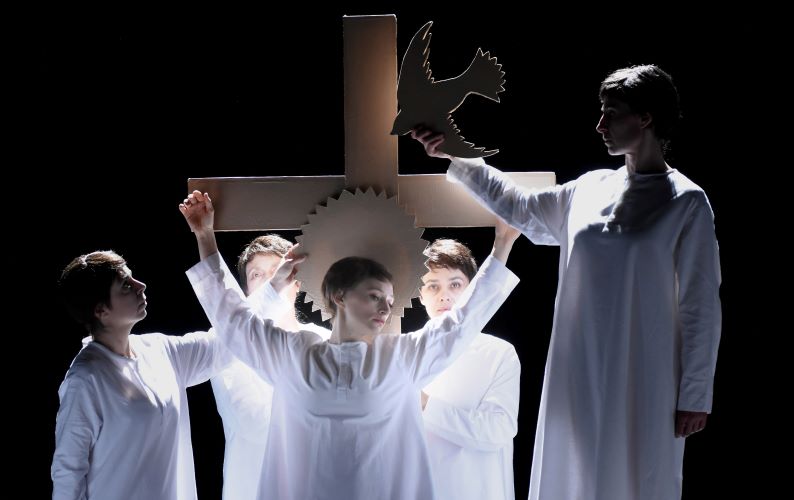
The Israeli Opera will present Francis Poulenc’s Dialogues des Carmélites from May 28 – June 3, 2024. The striking 20th century opera has never before been performed at the Israeli Opera. The current production was directed by Oliver Py, and the revival director is Daniel Izzo. Yet another exciting aspect of this production is the return of Maestro Asher Fisch after an absence of many years, to conduct Dialogues des Carmélites.
The opera, with its tragic exploration of fanaticism and faith, is inspired by historic events, telling the story of the Martyrs of Compiègne. During the French Revolution, during a two-year period known as the Reign of Terror, the leaders of the revolution attacked the Catholic Church, appropriating property, exiling, and executing priests and nuns, and passing legislation outlawing religious life. The nuns of the Carmelite community at Compiègne were interviewed by officials of the Revolution, and each nun was given the choice between breaking their vows and further punishment. They all refused to relinquish their religious life and vows of obedience, chastity, and poverty. They were all arrested and executed in 1794.
Poulenc wrote the opera’s libretto based on a work of the same name by George Bernanos. That, in turn, was based on a novel about these events written in 1931 by Gertrude von le Fort, The Song at the Scaffold, which told the story from the perspective of a fictional character Blanche de la Force. Bernanos was originally hired in 1947 to write the screenplay for a film that was never produced, but his text was staged as a play and retitled as
The opera opens in Paris of 1789, amid the terrors and riots of the French Revolution, when Blanche tells her father the Marquis de la Force that she has decided to become a nun and enter the Carmelite order at Compiègne. She is interviewed at the convent by the prioress, Madame de Croissy, who reminds Blanche that the convent is a house of prayer, and not a refuge from life. The painful death of the prioress from an illness stuns Blanche, yet she remains at the convent despite the urgings of her brother. The nuns are told that they must leave the convent. Mother Marie suggests to the nuns that they take a vow of martyrdom. As the nuns are led away from the convent, Blanche runs away. She is set to work as a servant at her father’s mansion, now taken over by the Revolution, as he has been sent to the guillotine. Mother Marie attempts to convince Blanche to rejoin the sisters, who have been arrested, but she remains at the mansion. Constance, Blanche’s friend from the convent, dreams that Blanche returns to join them. The nuns are sentenced to death, and as she ascends to the guillotine, Constance sees Blanche step out of the crowd to be with her in death. The opera reveals the faith, courage, and unity of the sisters, as well as the ravages of the Revolution and the violent fanaticism of its leaders, whose slogans of freedom and equality resulted in a vengeful reign of terror and violence.
French composer and pianist Francis Poulenc (1899 – 1963) composed in a variety of genres and styles, from light, clever works to more serious religious compositions. His oeuvre includes songs, chamber music, operas, ballets, and orchestral concert music. Born to a Catholic family, Poulenc became part of the Paris scene yet following the tragic death of a friend in a car crash he found consolation in a return to the faith of his youth, and his works reflected a more serious tone. Dialogues des Carmélites, which premiered in 1957, is considered one of his most ambitious works, and continues to be performed on opera stages worldwide.
Soloists in the opera are: Yael Levita alternating with Shaked Strul as Blanche; Shira Patchornik as Constance; Anat Czarny as Mother Marie; Shay Bloch as Madame de Croissy; Alla Vasilevitsky as Madame Lidoine; Ionut Pascu as Marquis de la Force.
Performances of Dialogues des Carmélites will take place from May 28 – June 3, 2024. Additional information and tickets may be found on the Israeli Opera website.





